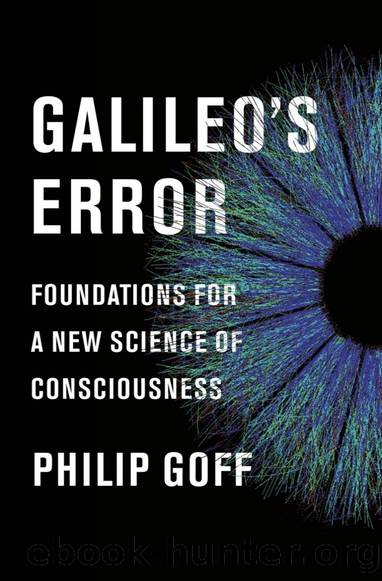Galileo's Error: Foundations for a New Science of Consciousness by Philip Goff

Author:Philip Goff [Goff, Philip]
Language: eng
Format: epub
ISBN: 9781524747961
Google: 7OW2DwAAQBAJ
Amazon: 1524747963
Barnesnoble: 1524747963
Goodreads: 43069288
Publisher: Knopf Doubleday Publishing Group
Published: 2019-11-05T00:00:00+00:00
SOMETHING LOST BETWEEN THE WARS
In May 1919 the English astronomer Arthur Eddington overturned more than two hundred years of scientific consensus by conducting the first experimental demonstration of Einsteinâs general theory of relativity. After the publication of the special theory of relativity in 1905, Einstein had spent ten years wrestling with the challenge of incorporating gravity into his revolutionary picture of the world; the general theory of relativity, published in November 1915, was the result of this decade of hard labor. In it, Einstein declared that Newton was wrong. Gravity was not, as Newton had supposed, a basic force. Instead gravity was to be explained in terms of a mutual causal interaction between matter and spacetime. Matter impacts on spacetime by altering its geometry, by curving it. The resulting curvature then impacts back on matter as material bodies have a tendency to follow the shortest path through spacetime, which is in turn determined by the curvature of spacetime. In other words, matter tells spacetime how to curve, while the curvature of spacetime tells matter how to move.
As Einstein published the general theory, Europe was more than a year into the Great War. As you might expect, the British at this time were not much interested in the speculative theories of German scientists, especially not ones that claimed to overturn the two-hundred-and-thirty-year hegemony of an English scientist. However, Eddington was a Quaker and an internationalist, and had little patience for nationalist prejudices. For Eddington, what mattered was the truth. During the First World War, he was secretary of the Royal Astronomical Society, and was granted exemption from military service on the basis of his scientific work being of national importance. As a result, Eddington was one of the first British scientists to absorb Einsteinâs complex new theory of gravity and was deeply enthused by what he read.
Only six months after the end of the war, together with the Astronomer Royal Frank Watson Dyson, Eddington conducted a series of observations of a solar eclipse from the island of Principe off the west coast of Africa. As the moon covered the sun, Eddington photographed stars visible around its covered edge. On the basis of this he was able to demonstrate that, precisely as Einsteinâs theory had predicted, the light from these stars had been bent by the spacetime curvature caused by the mass of the sun. Newtonâs theory did not predict that the starlight would be bent to this degree. Einstein was vindicated and overnight became an international celebrity.
Eddington went on to become a leading defender of relativity, not only persuading the scientific community of its truth but also reaching out to the public by finding vivid ways of explaining its meaning without the mathematical complexities. Einstein himself claimed that Eddingtonâs writings on relativity were âthe finest presentation of the subject in any language.â When Eddington presented his proof of relativity at the Royal Society, it was joked that Eddington was one of the three men in the world who actually understood relativity.
Download
This site does not store any files on its server. We only index and link to content provided by other sites. Please contact the content providers to delete copyright contents if any and email us, we'll remove relevant links or contents immediately.
| Deconstruction | Existentialism |
| Humanism | Phenomenology |
| Pragmatism | Rationalism |
| Structuralism | Transcendentalism |
| Utilitarianism |
The remains of the day by Kazuo Ishiguro(9000)
Tools of Titans by Timothy Ferriss(8398)
Giovanni's Room by James Baldwin(7347)
The Black Swan by Nassim Nicholas Taleb(7133)
Inner Engineering: A Yogi's Guide to Joy by Sadhguru(6797)
The Way of Zen by Alan W. Watts(6615)
The Power of Now: A Guide to Spiritual Enlightenment by Eckhart Tolle(5785)
Asking the Right Questions: A Guide to Critical Thinking by M. Neil Browne & Stuart M. Keeley(5776)
The Six Wives Of Henry VIII (WOMEN IN HISTORY) by Fraser Antonia(5516)
Astrophysics for People in a Hurry by Neil DeGrasse Tyson(5191)
Housekeeping by Marilynne Robinson(4449)
12 Rules for Life by Jordan B. Peterson(4307)
Ikigai by Héctor García & Francesc Miralles(4275)
Double Down (Diary of a Wimpy Kid Book 11) by Jeff Kinney(4273)
The Ethical Slut by Janet W. Hardy(4258)
Skin in the Game by Nassim Nicholas Taleb(4250)
The Art of Happiness by The Dalai Lama(4131)
Skin in the Game: Hidden Asymmetries in Daily Life by Nassim Nicholas Taleb(4007)
Walking by Henry David Thoreau(3963)
